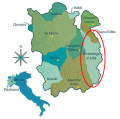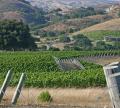Winery Weninger
时间:2012-12-26 11:00:57 阅读:4303
The Weninger biodynamic winery produces 75,000 bottles of wine on an area of 22 hectares divided into two areas Spern Steiner and Frettner. .jpg) 狂热的有机酒酒厂,亲力亲为,甚至为葡萄园亲手制作牛粪肥 The winery is located in Northern Transdanubia in northwestern Hungary on the border with Austria. The vineyards lie on a southeastern slope 220 meters above sea level and are protected against bad weather by the surrounding hills. Typical of the region is also the ever present wind which keeps the grapes healthy. The grapes enjoy a hot and humid microclimate in the vicinity of the Neusiedler Lake. Weninger winery is since 2006 the first Hungarian winery to work entirely biodynamical and follow the ideas of Rudolf Steiner (1861-1925). According to Franz Reinhard Weninger biodynamic winemaking is the use of compost, natural preparations, sulfur, copper and teas (teas of nettle, horsetail, chamomile) to ensure the fertility of the soil and strengthen the vines. The grape benefits from its natural rhythm, thus the growth is stimulated and the plant takes the maximum out of its own energy. Insecticides, herbicides and fungicides are not being used.
狂热的有机酒酒厂,亲力亲为,甚至为葡萄园亲手制作牛粪肥 The winery is located in Northern Transdanubia in northwestern Hungary on the border with Austria. The vineyards lie on a southeastern slope 220 meters above sea level and are protected against bad weather by the surrounding hills. Typical of the region is also the ever present wind which keeps the grapes healthy. The grapes enjoy a hot and humid microclimate in the vicinity of the Neusiedler Lake. Weninger winery is since 2006 the first Hungarian winery to work entirely biodynamical and follow the ideas of Rudolf Steiner (1861-1925). According to Franz Reinhard Weninger biodynamic winemaking is the use of compost, natural preparations, sulfur, copper and teas (teas of nettle, horsetail, chamomile) to ensure the fertility of the soil and strengthen the vines. The grape benefits from its natural rhythm, thus the growth is stimulated and the plant takes the maximum out of its own energy. Insecticides, herbicides and fungicides are not being used. .jpg) The winemaker will only intervene in the life of the grapes if absolutely necessary. Franz Reinhard Weninger, born in 1979, grew up on the family vineyard located in Horitschon in central Burgenland, Austria. After graduating as a winemaker, Franz Reinhard enlarged his knowledge of wine at a number of renowned wineries in Italy (Schloss Sallegg), California (Vinwood Kendall-Jackson) and Australia (Mundrakoona Estate). The vineyard named Spern Steiner once belonged to the Catholic Church in Sopron. The area has always been considered as the best and most expensive wine region of Sopron.
The winemaker will only intervene in the life of the grapes if absolutely necessary. Franz Reinhard Weninger, born in 1979, grew up on the family vineyard located in Horitschon in central Burgenland, Austria. After graduating as a winemaker, Franz Reinhard enlarged his knowledge of wine at a number of renowned wineries in Italy (Schloss Sallegg), California (Vinwood Kendall-Jackson) and Australia (Mundrakoona Estate). The vineyard named Spern Steiner once belonged to the Catholic Church in Sopron. The area has always been considered as the best and most expensive wine region of Sopron. .jpg) The vines, on average 50-years-old, are planted in mineral soils consisting of mica-gneiss.The roots of the vines get their strength in absorbing the minerals from deep below Mainly red wine is made from the grape Kékfrankos (Blaufränkisch). For Weninger's top wine "Spern Steiner ', the yield per hectare is less than 20 hectoliters. The harvest is done manually and will not start before mid-october. At harvesting, the not fully mature grapes are processed into compost and returned to the soil. Since 2007, besides the aging of the wines in oak barrels , Weninger also experiments with concrete for the fermentation of certain red wines. Because of the heat capacity of the concrete, it comes to a slow and balanced fermentation process. Moreover concrete also allows an increased oxygen admission just like wood.
The vines, on average 50-years-old, are planted in mineral soils consisting of mica-gneiss.The roots of the vines get their strength in absorbing the minerals from deep below Mainly red wine is made from the grape Kékfrankos (Blaufränkisch). For Weninger's top wine "Spern Steiner ', the yield per hectare is less than 20 hectoliters. The harvest is done manually and will not start before mid-october. At harvesting, the not fully mature grapes are processed into compost and returned to the soil. Since 2007, besides the aging of the wines in oak barrels , Weninger also experiments with concrete for the fermentation of certain red wines. Because of the heat capacity of the concrete, it comes to a slow and balanced fermentation process. Moreover concrete also allows an increased oxygen admission just like wood. .jpg) Weninger生物动力葡萄酒生产75,000瓶葡萄酒,在一个面积22公顷,分为两个地区Spern Steiner 和 Frettner。 该酒庄位于西北地区北部多瑙河匈牙利与奥地利的边界上。 葡萄园位于海平面220米以上的东南坡,周围的小山和保护,以防止恶劣天气。 该地区的典型是永远存在的风,使葡萄保持健康。 新锡德尔湖附近的葡萄享受炎热和潮湿的气候。 Weninger酒厂是自2006年以来的第一个匈牙利酒庄完全biodynamical工作的酒厂,并按照鲁道夫斯坦纳(1861年至1925年)的思想。 据弗朗茨·莱因哈德Weninger生物动力学酿酒是利用堆肥,天然制剂,硫,铜和茶(茶荨麻,马尾草,洋甘菊),以确保土壤的肥力和加强的葡萄树。 其天然葡萄的好处,不使用的杀虫剂,除草剂和杀真菌剂。 弗朗茨·莱因哈德Weninger,1979年出生,生长在奥地利布尔根兰州,家庭葡萄园位于Horitschon。 作为酿酒师毕业后,弗朗茨·莱因哈德扩大自己的知识。 葡萄园命名Spern在Sopron的天主教教会。 该地区一直被认为是最好的和最昂贵的葡萄酒产区索普隆。 葡萄藤,平均50岁,种植在矿质土壤中,根源从地底深处吸收矿物质。 主要是由红葡萄酒的的葡萄Kékfrankos(Blaufränkisch)。 Weninger顶级葡萄酒Spern施泰纳,每公顷产量不到20升。收获完全是手工完成,10月中旬之前不会启动。 收获时,没有完全成熟的葡萄转变成堆肥处理,并返回到土壤。 自2007年以来,除了老化的葡萄酒在橡木桶中,Weninger也与混凝土的某些红葡萄酒的发酵实验。
Weninger生物动力葡萄酒生产75,000瓶葡萄酒,在一个面积22公顷,分为两个地区Spern Steiner 和 Frettner。 该酒庄位于西北地区北部多瑙河匈牙利与奥地利的边界上。 葡萄园位于海平面220米以上的东南坡,周围的小山和保护,以防止恶劣天气。 该地区的典型是永远存在的风,使葡萄保持健康。 新锡德尔湖附近的葡萄享受炎热和潮湿的气候。 Weninger酒厂是自2006年以来的第一个匈牙利酒庄完全biodynamical工作的酒厂,并按照鲁道夫斯坦纳(1861年至1925年)的思想。 据弗朗茨·莱因哈德Weninger生物动力学酿酒是利用堆肥,天然制剂,硫,铜和茶(茶荨麻,马尾草,洋甘菊),以确保土壤的肥力和加强的葡萄树。 其天然葡萄的好处,不使用的杀虫剂,除草剂和杀真菌剂。 弗朗茨·莱因哈德Weninger,1979年出生,生长在奥地利布尔根兰州,家庭葡萄园位于Horitschon。 作为酿酒师毕业后,弗朗茨·莱因哈德扩大自己的知识。 葡萄园命名Spern在Sopron的天主教教会。 该地区一直被认为是最好的和最昂贵的葡萄酒产区索普隆。 葡萄藤,平均50岁,种植在矿质土壤中,根源从地底深处吸收矿物质。 主要是由红葡萄酒的的葡萄Kékfrankos(Blaufränkisch)。 Weninger顶级葡萄酒Spern施泰纳,每公顷产量不到20升。收获完全是手工完成,10月中旬之前不会启动。 收获时,没有完全成熟的葡萄转变成堆肥处理,并返回到土壤。 自2007年以来,除了老化的葡萄酒在橡木桶中,Weninger也与混凝土的某些红葡萄酒的发酵实验。
.jpg) 狂热的有机酒酒厂,亲力亲为,甚至为葡萄园亲手制作牛粪肥 The winery is located in Northern Transdanubia in northwestern Hungary on the border with Austria. The vineyards lie on a southeastern slope 220 meters above sea level and are protected against bad weather by the surrounding hills. Typical of the region is also the ever present wind which keeps the grapes healthy. The grapes enjoy a hot and humid microclimate in the vicinity of the Neusiedler Lake. Weninger winery is since 2006 the first Hungarian winery to work entirely biodynamical and follow the ideas of Rudolf Steiner (1861-1925). According to Franz Reinhard Weninger biodynamic winemaking is the use of compost, natural preparations, sulfur, copper and teas (teas of nettle, horsetail, chamomile) to ensure the fertility of the soil and strengthen the vines. The grape benefits from its natural rhythm, thus the growth is stimulated and the plant takes the maximum out of its own energy. Insecticides, herbicides and fungicides are not being used.
狂热的有机酒酒厂,亲力亲为,甚至为葡萄园亲手制作牛粪肥 The winery is located in Northern Transdanubia in northwestern Hungary on the border with Austria. The vineyards lie on a southeastern slope 220 meters above sea level and are protected against bad weather by the surrounding hills. Typical of the region is also the ever present wind which keeps the grapes healthy. The grapes enjoy a hot and humid microclimate in the vicinity of the Neusiedler Lake. Weninger winery is since 2006 the first Hungarian winery to work entirely biodynamical and follow the ideas of Rudolf Steiner (1861-1925). According to Franz Reinhard Weninger biodynamic winemaking is the use of compost, natural preparations, sulfur, copper and teas (teas of nettle, horsetail, chamomile) to ensure the fertility of the soil and strengthen the vines. The grape benefits from its natural rhythm, thus the growth is stimulated and the plant takes the maximum out of its own energy. Insecticides, herbicides and fungicides are not being used. .jpg) The winemaker will only intervene in the life of the grapes if absolutely necessary. Franz Reinhard Weninger, born in 1979, grew up on the family vineyard located in Horitschon in central Burgenland, Austria. After graduating as a winemaker, Franz Reinhard enlarged his knowledge of wine at a number of renowned wineries in Italy (Schloss Sallegg), California (Vinwood Kendall-Jackson) and Australia (Mundrakoona Estate). The vineyard named Spern Steiner once belonged to the Catholic Church in Sopron. The area has always been considered as the best and most expensive wine region of Sopron.
The winemaker will only intervene in the life of the grapes if absolutely necessary. Franz Reinhard Weninger, born in 1979, grew up on the family vineyard located in Horitschon in central Burgenland, Austria. After graduating as a winemaker, Franz Reinhard enlarged his knowledge of wine at a number of renowned wineries in Italy (Schloss Sallegg), California (Vinwood Kendall-Jackson) and Australia (Mundrakoona Estate). The vineyard named Spern Steiner once belonged to the Catholic Church in Sopron. The area has always been considered as the best and most expensive wine region of Sopron. .jpg) The vines, on average 50-years-old, are planted in mineral soils consisting of mica-gneiss.The roots of the vines get their strength in absorbing the minerals from deep below Mainly red wine is made from the grape Kékfrankos (Blaufränkisch). For Weninger's top wine "Spern Steiner ', the yield per hectare is less than 20 hectoliters. The harvest is done manually and will not start before mid-october. At harvesting, the not fully mature grapes are processed into compost and returned to the soil. Since 2007, besides the aging of the wines in oak barrels , Weninger also experiments with concrete for the fermentation of certain red wines. Because of the heat capacity of the concrete, it comes to a slow and balanced fermentation process. Moreover concrete also allows an increased oxygen admission just like wood.
The vines, on average 50-years-old, are planted in mineral soils consisting of mica-gneiss.The roots of the vines get their strength in absorbing the minerals from deep below Mainly red wine is made from the grape Kékfrankos (Blaufränkisch). For Weninger's top wine "Spern Steiner ', the yield per hectare is less than 20 hectoliters. The harvest is done manually and will not start before mid-october. At harvesting, the not fully mature grapes are processed into compost and returned to the soil. Since 2007, besides the aging of the wines in oak barrels , Weninger also experiments with concrete for the fermentation of certain red wines. Because of the heat capacity of the concrete, it comes to a slow and balanced fermentation process. Moreover concrete also allows an increased oxygen admission just like wood. .jpg) Weninger生物动力葡萄酒生产75,000瓶葡萄酒,在一个面积22公顷,分为两个地区Spern Steiner 和 Frettner。 该酒庄位于西北地区北部多瑙河匈牙利与奥地利的边界上。 葡萄园位于海平面220米以上的东南坡,周围的小山和保护,以防止恶劣天气。 该地区的典型是永远存在的风,使葡萄保持健康。 新锡德尔湖附近的葡萄享受炎热和潮湿的气候。 Weninger酒厂是自2006年以来的第一个匈牙利酒庄完全biodynamical工作的酒厂,并按照鲁道夫斯坦纳(1861年至1925年)的思想。 据弗朗茨·莱因哈德Weninger生物动力学酿酒是利用堆肥,天然制剂,硫,铜和茶(茶荨麻,马尾草,洋甘菊),以确保土壤的肥力和加强的葡萄树。 其天然葡萄的好处,不使用的杀虫剂,除草剂和杀真菌剂。 弗朗茨·莱因哈德Weninger,1979年出生,生长在奥地利布尔根兰州,家庭葡萄园位于Horitschon。 作为酿酒师毕业后,弗朗茨·莱因哈德扩大自己的知识。 葡萄园命名Spern在Sopron的天主教教会。 该地区一直被认为是最好的和最昂贵的葡萄酒产区索普隆。 葡萄藤,平均50岁,种植在矿质土壤中,根源从地底深处吸收矿物质。 主要是由红葡萄酒的的葡萄Kékfrankos(Blaufränkisch)。 Weninger顶级葡萄酒Spern施泰纳,每公顷产量不到20升。收获完全是手工完成,10月中旬之前不会启动。 收获时,没有完全成熟的葡萄转变成堆肥处理,并返回到土壤。 自2007年以来,除了老化的葡萄酒在橡木桶中,Weninger也与混凝土的某些红葡萄酒的发酵实验。
Weninger生物动力葡萄酒生产75,000瓶葡萄酒,在一个面积22公顷,分为两个地区Spern Steiner 和 Frettner。 该酒庄位于西北地区北部多瑙河匈牙利与奥地利的边界上。 葡萄园位于海平面220米以上的东南坡,周围的小山和保护,以防止恶劣天气。 该地区的典型是永远存在的风,使葡萄保持健康。 新锡德尔湖附近的葡萄享受炎热和潮湿的气候。 Weninger酒厂是自2006年以来的第一个匈牙利酒庄完全biodynamical工作的酒厂,并按照鲁道夫斯坦纳(1861年至1925年)的思想。 据弗朗茨·莱因哈德Weninger生物动力学酿酒是利用堆肥,天然制剂,硫,铜和茶(茶荨麻,马尾草,洋甘菊),以确保土壤的肥力和加强的葡萄树。 其天然葡萄的好处,不使用的杀虫剂,除草剂和杀真菌剂。 弗朗茨·莱因哈德Weninger,1979年出生,生长在奥地利布尔根兰州,家庭葡萄园位于Horitschon。 作为酿酒师毕业后,弗朗茨·莱因哈德扩大自己的知识。 葡萄园命名Spern在Sopron的天主教教会。 该地区一直被认为是最好的和最昂贵的葡萄酒产区索普隆。 葡萄藤,平均50岁,种植在矿质土壤中,根源从地底深处吸收矿物质。 主要是由红葡萄酒的的葡萄Kékfrankos(Blaufränkisch)。 Weninger顶级葡萄酒Spern施泰纳,每公顷产量不到20升。收获完全是手工完成,10月中旬之前不会启动。 收获时,没有完全成熟的葡萄转变成堆肥处理,并返回到土壤。 自2007年以来,除了老化的葡萄酒在橡木桶中,Weninger也与混凝土的某些红葡萄酒的发酵实验。 















